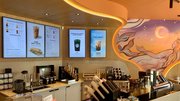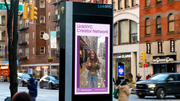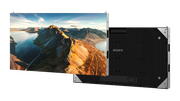Article
A two-way integration of digital signage and mobile
EnQii and Kombi have partnered on an app to further integrate digital signage and mobile techs.

December 1, 2010 by Christopher Hall — w, t
EnQii joining forces with Kombi may sound like something out of a Babylonian epic or a George Romero flick, but the partnership between the two tech firms is working to hasten the integration of digital signage and mobile.
At the recent Customer Engagement Technology World show in New York City, digital out-of-home media company EnQii and mobile business firm Kombi showcased how their partnership would work in a retail environment and could help change the focus of retailer-customer relations.
Enqii training and product support manager Josh Nagy talked at the show about the Ontario, Canada-based EnQii's move to include in its digital signage QR codes that provide smart phone wielders with additional product and brand information — and then provide an even more personalized interaction with consumers through the joint EnQii/Kombi mobile application.
(QR codes, or "quick response" codes, are matrix 2-D codes that contain data, like text, images or website URLs.)
"The idea is you can take a picture of this QR code and store this information into your wallet within the phone itself," Nagy said, gesturing at the black and white matrix displayed on a digital display. "And since the phone is aware of location and who you are and the time and the weather and the city you're in, we can actually send very specific location-based information to that particular user."
The joint app allows retailers to track what customers are looking for, and as customers walk through the store they can snap photos of the QR codes of the items and accessories they're interested in and then give that information to the store personnel at the counter, Nagy says.
On top of that, EnQii has added a customized mobile application with Kombi, Nagy says.
John Eisenhauer, CEO and CTO of the Bainbridge Island, Wash.-based Kombi Corp., says his company has an adaptive smart mobile platform that allows it to connect a virtually infinite number of smart mobile devices (from consumer-grade electronics like the iPhone and Blackberry to more industrial-grade devices like the tablets carried by UPS delivery drivers) to a cloud-based reasoning engine — and "then through that cloud-based reasoning engine to any number of back-end enterprise systems, including in this example our fairly direct conversation with EnQii's platform."
In the example on display at the EnQii booth at the show, Kombi and EnQii showcased the ability for their app to "announce" to a store that an individual consumer is approaching, Eisenhauer says, "and have that influence what's happening on the digital screens in the store and have the screens be able to push back to the phone synchronized offers," turning the consumer's smart phone into "an intimate interaction device."
Consumers get coupons and special offers, wayfinding guidance through the store, introductions to store personnel, and even use their smart phones for transactions, either at the point of sale or through m-commerce or e-commerce, Eisenhauer says. The app could send a QR code to the smart phone that would then act as a receipt or proof-of-purchase, so the shopper can leave the store with his or her purchases.
And does the QR code serve as an opt-in to messaging from the retailer? Not necessarily, Eisenhauer says.
"In the retail environment, we're perceiving this emerging as a premier loyalty program, replacing the plastic card in somebody's wallet or purse with the phone that's already in their wallet or in their pocket or purse," he said.
The possibilities inherent in mobile loyalty apps could allow loyalty to emerge in a new way, Eisenhauer says, since there was no way to communicate to the customer through their plastic loyalty card, but there certainly is through their mobile or smart phone.
"Forever, brick-and-mortar loyalty has meant consumer loyal to brick-and-mortar; it has never had to mean brick-and-mortar loyal to consumer," he said. "If brick-and-mortar is going to have a future, they need to solve that problem, and we're giving them a mechanism by which they can do that."
Now retailers and marketers will be able to use rule-based, one-on-one communications with the consumer that is based on knowing, not guessing, who the consumer is, where they are and what they need, while also using the correct language, lifestyle imagery and loyalty discount if applicable, Eisenhauer says.
Retailers like Macy's, Best Buy and Target already have started adopting location-based smart phone apps like shopkick, which allows users to receive points and other rewards, such as instant mobile coupons, just for entering their stores. The shopkick app is a third-party mobile app for iPhone which leverages the popularity of "checking in" at various retail locations to earn points and other rewards by entering or exploring specific areas of the store.
When asked to compare Kombi's solution with an app like shopkick, Eisenhauer says that shopkick's technical functionality is a subset of the Kombi app's functionality, and that shopkick's core business is a B2C and "standalone" proposition.
"We operate as a B2B2C business, and are not focused on the 'choose me' world that allows an anonymous user to browse past any number of brands/offers who are not even aware of the user's existence, much less that the user has considered but not chosen them," he said. "There IS an admirable aspect of brand loyalty and location-based (LBS) awareness in shopkick's offer, but it is focused (as most historic loyalty programs are) on customer-to-brand loyalty and on value (i.e. price discounts) as its prime motivator."
Kombi, he says, allows a brand to press much more deeply. It can connect in real-time to the user's current context (speed, direction, loyalty points, purchase history, etc.) and to the venue's back-end systems (POS, digital signs, kiosks, environmental and lighting controls, security access, etc.) and to a real-time rules-engine to make one-to-one sense of it all, he says.
Further, he says, the value of an app like shopkick diminishes greatly when the consumer is not actively shopping; whereas "Kombi can continue to add lifestyle benefit 'out in the wild' to (finally) promote brand-to-customer loyalty well beyond (but still including) value motivation, including truly personalized and context-appropriate entertainment, convenience, education, social interaction, way-finding, privilege, etc."
And there's more: The application could also be used by first responders in emergency situations, both to provide information to emergency and relief workers and to provide instructions to civilians fleeing the area or seeking shelter, Eisenhauer says. Kombi was just named in a five-year, $250 million Federal Emergency Management Agency (FEMA) contract, to help provide real-time disaster and recovery services, he says.
But in the world of retail and consumer marketing, Eisenhauer says, mobile tech offers the possibility to replace guesswork with actual knowledge.
"A lot of times what we do in broadcast and narrowcasting is well-informed, statistically driven guessing," he said. "We don't have to guess who we're talking to when we're talking on a cell phone; we know who we're talking to."
 ChatGPT
ChatGPT Grok
Grok Perplexity
Perplexity Claude
Claude






